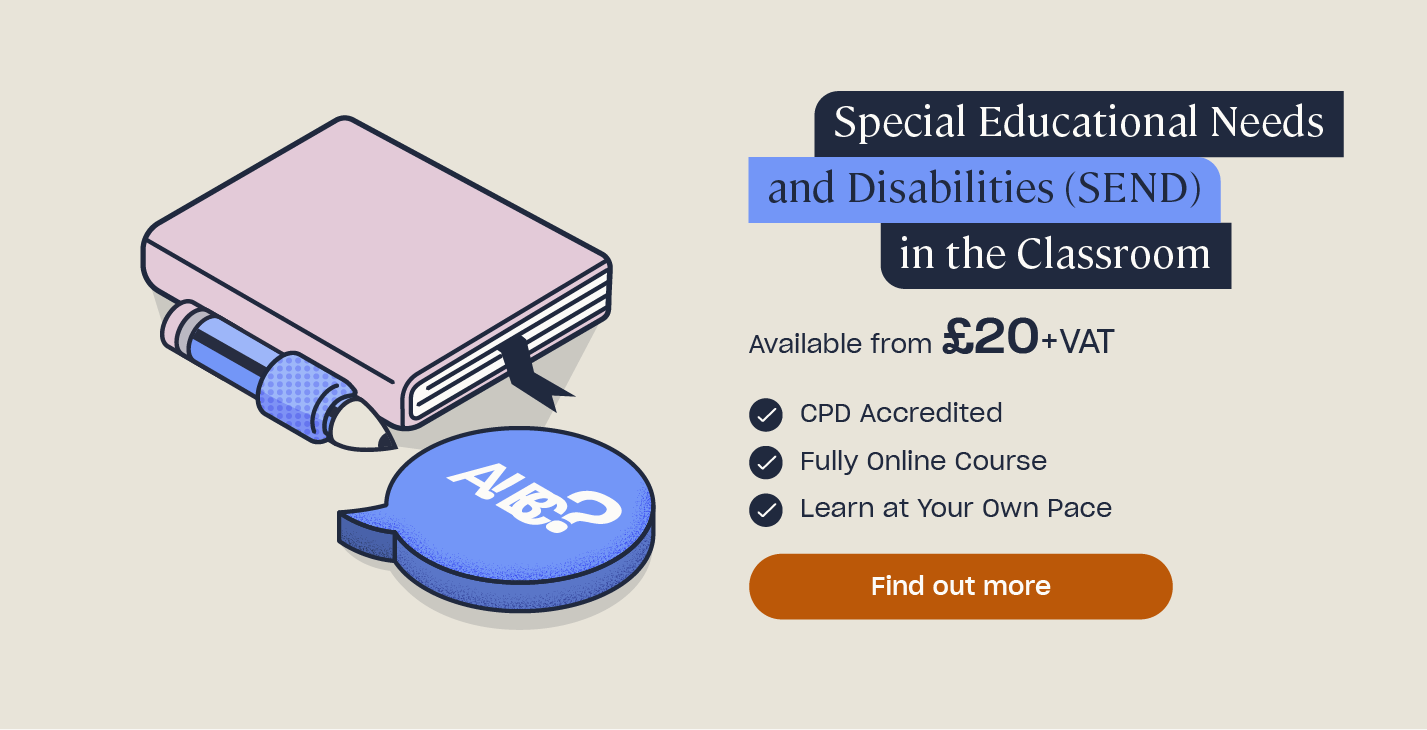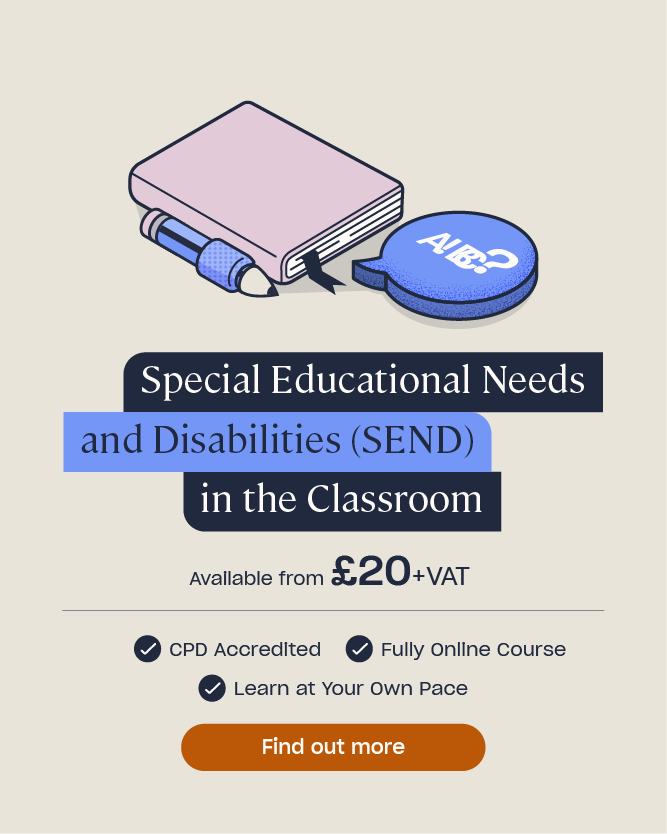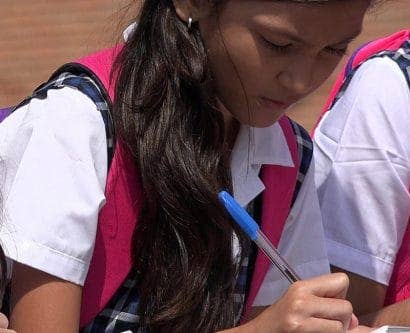Summary of the SEND and Alternative Provision (AP) Improvement Plan
Following the Special Educational Needs and Disabilities (SEND) review published in March 2022, the SEND Alternative Provision (AP) Improvement Plan has been released. The aim of the SEND and AP Improvement Plan is to deliver a better experience for children and young people with SEND and to restore families’ confidence in the system.
In this article, we will provide an overview of the SEND Review and what it set out to achieve, as well as outlining what the SEND and AP Improvement Plan includes and how this might affect your practice.
What are SEND and AP?
Before we continue, it is useful to clarify the key terms used:
Statutory guidance defines a child with Special Educational Needs and/or Disabilities (SEND) as someone who:
- Has a significantly greater difficulty in learning than the majority of others of the same age, or
- Has a disability which prevents or hinders him or her from making use of facilities of a kind generally provided for others of the same age in mainstream schools or mainstream post-16 institutions.
The SEND Code of Practice lays out four broad areas of need: communication and interaction; cognition and learning; social, emotional and mental health difficulties and sensory and/or physical needs. It is likely that a child may experience challenges across more than one area of need and SEND provision should always be based on the individual needs of the child.
The majority of children with SEND attend mainstream provision, whilst a smaller percentage may have their needs best met in a special school.

Alternative Provision (AP) refers to education provided by the local authority for children who cannot, for some reason, attend a mainstream setting (and do not attend a special school). This is sometimes full-time and sometimes provided on a part-time basis alongside some attendance at the mainstream setting. For example, some schools have a specialist resourced provision attached, usually focussing on a particular area of need, such as speech, language and communication or autism. Children who meet the criteria will spend a portion of their time receiving education in the unit, but joining their peers in the mainstream setting for certain learning activities.
AP can also often be provided on a temporary basis – with a view to returning to the mainstream setting full time.
Children may need to access alternative provision for a range of reasons – these could relate to health needs (for example, where a child is recovering from serious illness) or due to exclusions from the mainstream school due to social, emotional and mental health needs impacting their behaviour.
Alternative provision includes, but is not limited to:
- Pupil Referral Units (PRUs).
- Specialist Resourced Provision (SRP).
- Hospital schools.
- Vocational providers.
- Therapeutic settings.
- Outdoor learning centres.
Overview of the SEND Green Paper
The SEND Review was a green paper that set out the proposals for the future of the SEND and AP systems.
It was commissioned to improve an inconsistent, bureaucratic and complicated system which often means delays in children and young people accessing the right support for their needs.

The main proposals that the SEND Review initially set out to achieve include:
- Creating a single national SEND and AP system aiming for greater consistency of support and provision for children with SEND.
- Excellent provision from early years to adulthood to ensure children and young people with SEND are prepared to thrive in employment and/or higher education.
- Alternative Provision to support children whose behaviour and other needs present a barrier to learning.
- System roles, accountabilities and funding reform to ensure clarity and effective collaboration.
- Delivering change so children can thrive and families are able to navigate the system.
After a 16-week public consultation, the government began work on the SEND and AP improvement plan.
What is the SEND and AP Improvement Plan?
The SEND and AP Improvement Plan states its mission as:
- Fulfilling childrens’ potential through them enjoying their childhood, achieving good outcomes and being well prepared for adulthood and employment.
- Building parents’ trust, helping them navigate the system easily and making them feel confident that their children will get the right support, in the right place and at the right time.
- Providing financial stability for local authorities while using the budget to meet children and young peoples’ needs.
New national standards aim to aid early identification of children and young peoples’ needs and clearly show the types of support necessary so families can be more responsive. In turn, the hope is that fewer children will need to access support through an Education, Health and Care Plan (EHCP). For parents of children that still require an EHCP, a clear and simple system will replace the old one to ease decision making and access to the support needed.
The government also states that they are committed to delivering an alternative provision that is fully integrated in the wider SEND system as it plays a vital role in supporting children and young people to remain in mainstream education. This refers to all settings that provide alternative provision, including but not limited to, schools maintained by the Local Authority, academies, free schools and pupil referral units (PRUs). The alternative provision works by offering early and targeted support, as well as transitional places in alternative provision schools for pupils that need more intensive support.
Looking to Learn More?
Our SEND in the Classroom course will teach you about your legal responsibilities, and best practice with regards to supporting children with SEND. It looks at applying the Graduated Approach, explores each of the four main areas of need and offers a range of practical strategies to help you provide effective support to children and young people with SEND in your setting.
The issues with funding have also been acknowledged with the government explaining that £400 million will be allocated to local authorities in 2023-24 to help with the increasing costs of supporting individuals with SEND. In addition, the systematic changes are hoped to ensure a more sustainable and effective system for the future.
The Special Educational Needs and Disabilities (SEND) and Alternative Provision (AP) Improvement Plan states the following key aims:
The National System Will be Underpinned by National Standards
The government have stated that to meet this aim they will:
- Include perspectives from education, health and care when developing the National Standards.
- Start testing elements of the national standards by the end of 2023 to identify any needed reforms.
- By the end of 2025, publish the National Standards that are most deliverable in the current system.
- Introduce local SEND and alternative provision partnerships to plan support for children and young people with SEND who are in alternative provision.
- Create local inclusion plans to outline the needs of children and young people that will be met in line with National Standards.
- Use the Change Programme to develop and share best practice of partnerships and plans, starting with the Regional Expert Partnership areas from spring 2023.
- Invest £2.6 billion between 2022 and 2025 to fund new places and improve existing provision for children and young people with SEND or who require alternative provision.
- Use the £30 million in funding to develop approaches for short breaks for children, young people and their families.
- Review social care legislation relating to SEND children so families are clear around the support they are legally entitled to.
- Deliver a standard EHCP template, with supporting processes and guidance from 2025. Including developing digital requirements.
- Require local authorities to improve the information available to families, including providing a list of suitable settings informed by the local inclusion plan.
- Create a three-tier alternative provision system, focusing on targeted early support within mainstream school, time-limited intensive placements in an alternative provision setting and longer-term placements to support return to mainstream or a sustainable post-16 destination.

Ensuring a Smooth Transition
To meet this aim, the government will:
- Publish guidance to support transitions between all stages of education, and into employment and adult services.
- Conduct a trial to consider the evidence required to access flexibilities to standard English and mathematics requirements for apprenticeships.
- Invest £18 million between 2022 and 2025 to double the capacity of the Supported Internships Programme.
- Continue to support the Department for Work and Pensions’ Adjustments Passport to smooth the transition into employment.
- Improve the Disabled Students’ Allowance process by continuing to work with the Student Loans Company to reduce the time for support to be agreed.
Ensuring a Skilled Workforce and Excellent Leadership
The government have explained that in order to meet this aim they will:
- Introduce a new leadership level SENCo (Special Educational Needs Co-ordinator) NPQ (National Professional Qualification) for schools.
- Review the Initial Teacher Training and Early Career Frameworks. .
- Provide funding for up to 5,000 early years staff to gain an accredited Level 3 early years SENCo qualification to support the early years sector, with training running until August 2024.
- Invest £21 million to increase the capacity of specialists, including training two more cohorts of educational psychologists in the academic years 2024 and 2025.
- Run Early Language and Support For Every Child (ELSEC) pathfinders to improve access to speech and language therapy for those who need it.
- Work together for a joint Department for Education and Department of Health and Social Care approach to SEND workforce planning, including establishing a steering group in 2023 to oversee this work, which should be complete by 2025.
- Publish the first three practice guides for frontline professionals, including the Nuffield Early Language Intervention, the work of the Autism Education Trust and the government’s guidance on promoting children and young people’s mental health and wellbeing.
- Propose new guidance on delivering a SEND casework service to families when consulting on the SEND Code of Practice.
- Develop a longer-term approach for teaching assistants to ensure their impact is consistent across the system, starting with a research project to develop the evidence base on current school approaches, demand and best practice.
- Strongly encourage the adoption of the DSCO (Designated Social Care Officer) role in each local area, including by proposing an amendment to the SEND Code of Practice.
- Extend funding until March 2025 of the AP specialist taskforce (APST) trial programme, which is testing co-location of a diverse specialist workforce in pilot alternative provision schools.

Strengthened Accountabilities and Clear Routes of Redress
In order to meet this aim, the government will:
- Publish a local and national inclusion dashboard from autumn 2023 to support the development of local inclusion plans, giving parents improved transparency of local performance, informing decision-making and driving self-improvement with ongoing updates and iterations.
- Deliver updated Ofsted and Care Quality Commission (CQC) Area SEND inspections from 2023 with a focus on the outcomes and experience of children and young people with SEND and in alternative provision.
- Create a ladder of intervention for local areas from 2023, greater powers for the Secretary of State for Health through the Health and Care Act 2022 and action for all where statutory duties for children and young people with SEND and in alternative provision are not met, to strengthen accountabilities across all parts of the system.
- Require every Integrated Care Board to have a named Executive Board member lead accountable for SEND.
- Facilitate a more joined-up response between the Department for Education and NHS England to improve outcomes for children and young people with SEND, including social, emotional and mental health issues, and tackle systemic failings leading to significant concerns.
- Strengthen redress for individual disagreements by clarifying who is responsible for resolving complaints, undertaking further investigation and testing of effective mediation approaches.
- Set up an expert group to support the development of a bespoke national alternative provision performance framework.
- Work with local authorities, trusts and school leaders to review processes and develop options for ensuring transparent and effective movement of pupils without EHCPs, such as those requiring alternative provision, to address behavioural needs.
A Financially Sustainable System Delivering Improved Outcomes
To meet this aim, the government will:
- Increase core school funding by £3.5 billion in 2023-24 compared to the year before, of which almost £1 billion of that increase will go towards high needs.
- Support local authorities through the Delivering Better Value and the Safety Valve programmes and share the best practice from local areas with inclusive and sustainable high needs provision.
- Develop a system of funding bands and tariffs so that consistent National Standards are backed by consistent funding across the country.
- Publish a response to the consultation on the schools’ National Funding Formula in 2023 which includes proposals on funding for SEND, including the notional SEND budget, and a mechanism for transferring funding to high needs budgets.
- Develop new approaches to funding alternative provision aligned to their focus on preventative work with, and reintegration of pupils into, mainstream schools. This will be done in consultation with mainstream schools, the alternative provision sector and local authorities.
- Re-examine the state’s relationship with independent special schools to ensure comparable expectations for all state-funded specialist providers are set.

Responding to the SEND and AP Improvement Plan
The SEND and AP improvement plan aims to improve outcomes for children and young people, improve experiences for families and deliver financial stability. However, there are no immediate changes and it is likely to be a few years before the plans that have been set out will come into effect. Additionally, there may be a new government in place after the next general election which could also impact the roll out of the plan.
Making sure your own level of knowledge and confidence, with regards to supporting children with SEND, is high can help equip you for the future changes. Essentially, your day-to-day practice will still continue to be grounded in providing effective, personalised support that meets the needs and aspirations of the individual children you work with – as laid out in the SEND Code of Practice.
Looking to Learn More?
Our range of articles can help you prepare for the changes that will be made by updating your knowledge and skills. We have articles on What Specific Learning Difficulties are, How to Support SEMH in Schools, How to Support Children with Pathological Demand Avoidance (PDA), What is SEND in Early Years and Supporting Pupils with SEN in the Classroom.
With regards to what can be expected, parents should expect clear information on what support their child can get, where they can turn for help and how to make use of support. The plan aims to remove the current situation where there are inconsistencies in support, depending on where you live in the country. All children and young people with SEND should expect access to the right support to thrive and reach their full potential. Finally, providers should expect further clarity on the support they should be providing and clear explanations of who they should be working with to ensure this.
The SEND and AP improvement plan aims to improve outcomes for children and young people with SEND and to rebuild families’ confidence in the system. The government has outlined their plans to deliver their aims with changes expected to come into place over the next few years.
Further Resources:
- Special Educational Needs and Disabilities (SEND) in the Classroom Course
- Supporting Pupils with SEN in the Classroom: Guidance for Teachers
- 5 Ways to Maximise Pupil Voice
- SEND Review: Summary of the Green Paper 2022
- What is the Local Offer?
- How to Support Children With Speech, Language, and Communication Needs
- Special Educational Needs & Disability (SEND) Quiz











